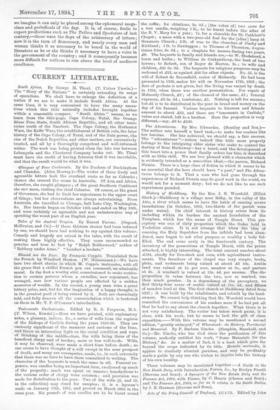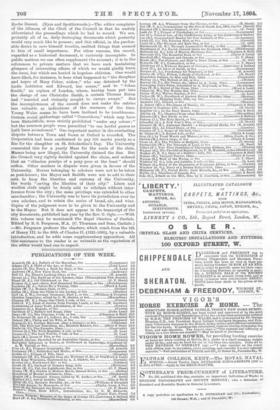Acts of the Privy Council of England, 1571-75. Edited by
John Roche Dasent. (Eyre and Spottiswoode.)—The editor complains of the idleness of the Clerk of the Council in that he unduly abbreviated the proceedings which he had to record. We are, probably all of us, daily destroying documents which posterity would very much like to possess ; and this official, in the pardon- able desire to save himself trouble, omitted things that seemed to him of small importance. For other reasons, the record, regarded as a historical document, is curiously incomplete. In public matters we can often supplement the account ; it is in the references to private matters that we have such tantalising glimpses of interesting affairs of which we would gladly learn the issue, but which are buried in hopeless oblivion. One would have liked, for instance, to hear what happened to "the daughter and heyre of Mary Cokar, widow," who was detained by the Ladie Lettleton and Edward, her sonne," and to "Johan Smith," an orphan of London, whom, having been put into the charge of one Christofer Smith, a certain Thomas Eaton had "married and violently sought to carrye awaye." But the incompleteness of the record does not make the entries less valuable as indications of the manners of the time. Young Wales seems to have been inclined to be troublesome. Certain social gatherings called " Comorthees," which may have been Eisteddfods, were strictly prohibited "under any colour;" but the common people were permitted "to use lawful games as hath been accustomed." One important matter in the everlasting dispute between Town and Gown at Oxford is recorded. The Corporation had been condemned to pay 100 marks yearly as a fine for the slaughter on St. Scholastica's Day. The University commuted this for a yearly Mass for the souls of the slain. Masses being now illegal, the University claimed the fine. But the Council very rightly decided against the claim, and ordered that an " oblacion yerelye of a peny pece at the least" should suffice. Other matters in dispute were given in favour of the University. Horses belonging to scholars were not to be taken as post-horses ; the Mayor and Bailiffs were not to add to their oath to keep the liberties and customs of the University, the words "saving the liberties of their city." Linen and woollen cloth might be freely sold to scholars without inter- ference from the city ; the same privilege was extended to other merchandise ; the University was to have its jurisdiction over its own scholars, and to retain the assize of bread, ale, and wine. Copies of the judgment were to be given to the University and to the Mayor. But it does not appear in the transcript of the city documents, published lad year by the Rev. 0. Ogle.—With this volume may be mentioned The Royal Charters of Carlisle. Edited by R. S. Ferguson, M.A. (C. Thurnain and Sons, Carlisle.) —Mr. Ferguson prefaces the charters, which reach from the 5th of Henry III. to the 86th of Charles II. (1221-1685), by a valuable introduction, and he adds some supplementary appendices. All this assistance to the reader is as valuable as the reputation of the editor would lead one to expect.



















































 Previous page
Previous page